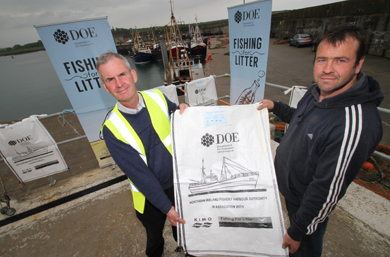Following the launch of the Fishing for Litter initiative by Minister Mark H Durkin earlier this year, local harbourmaster John Smyth in the County Down fishing port of Ardglass has once again reminded local fishermen of the benefits of taking their litter trawled up at sea back to port for disposal.
[caption id="attachment_50309" align="alignleft" width="390"] Ardglass harbourmaster John Smyth with local skipper David Cope promoting the awareness about the Fishing for Litter scheme.[/caption]
Ardglass harbourmaster John Smyth with local skipper David Cope promoting the awareness about the Fishing for Litter scheme.[/caption]
Mr Smyth explained that for coastal fishing towns such as Kilkeel, Ardglass and Portvogie, that cleaner seas literally have a great impact on the quality of sea life. He said: “By removing waste from the sea, beaches will be cleaner and safer. For fishermen, it means that there will be less damage to nets and less contamination of their catch.
“All trawlers catch litter at sea and each boat will be supplied with durable re-usable waste bags they can return to harbour for disposal. It is just a matter of the crew members throwing the sacks into a designated skip on the harbour. Alternatively, the harbour team can by arrangement come along and collect these bags.”
“This waste will end up in a waste disposal plant and will mostly be recycled. For the early past of this year, fishing has been very poor this year and as a result boats have quite often been confined to port because of bad weather low prawn catches. The summer months are their peak times for catching and that is also the times they will be trawling up litter from the sea bed.”
Fishing for Litter is a project funded by the DOE and was initially launched in Ardglass and will be extended across the three main fishing ports of Northern Ireland. The scheme is run by the Northern Ireland Fisheries and Harbour Authority who operate the harbours.
Mr Smyth added: “Years ago the conventional wisdom was that the oceans were so vast that any pollution would be diluted into safe measures. We now know this is wrong. Smaller sea creatures feed on waste which in turn makes its way into the food chain to us.
“In recent decades this problem has become much worse with the problem of the extensive use of petrochemical products such as plastics and oil-basedpaints which don’t occur naturally. Nature has no way to deal with this so they remain in the sea causing damage to the habitats and wildlife that lives there.
“We hope that the fishing industry remains viable for many years to come as it has for centuries supported our local coastal communities. We are delighted to be supported by KIMO, a local government voice in fighting marine pollution, in Fishing for Litter.”
www.nifha.co.uk ]]>

























